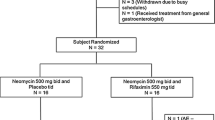Abstract
Recent studies have shown that normalization of the lactulose breath test (LBT) with neomycin leads to a significant reduction in irritable bowel syndrome (IBS) symptoms. This subanalysis was done on the constipation-predominant IBS subgroup of patients (C-IBS) to test the ability of neomycin to improve constipation and its correlation with the elimination of methane on breath test. IBS subjects underwent LBT in a blinded fashion. They were then randomly allocated to neomycin or placebo groups. For the purpose of this analysis, only the C-IBS subjects were identified. They were then evaluated for global improvement, abdominal pain, and constipation severity. The ability of neomycin to eliminate methane and its associated improvement in constipation was also determined. One hundred eleven subjects meeting Rome I criteria for IBS were included in the study. Thirty-nine of these had C-IBS. Of these, 20 received placebo and 19 received neomycin. With neomycin, a global improvement of 36.7±7.9% was seen, compared to 5.0±3.2% for placebo (P < .001) in the intention-to-treat analysis. Constipation was improved by 32.6±9.9% with neomycin compared to 18.7±7.2% for placebo (P=.26). Of the original 111 subjects, 12 demonstrated methane on breath test. All 12 of these patients were constipation predominant. In the methane producers receiving neomycin or placebo, improvement in constipation was significantly greater in those receiving neomycin (44.0±12.3%) compared to placebo (5.0±5.1%) (P < .05). Treatment with neomycin improves constipation in C-IBS. This improvement depends on the presence and elimination of methane on breath test.



Similar content being viewed by others
References
Bearcroft CP, Perrett D, Farthing MJ (1998) Postprandial plasma 5-hydroxytryptamine in diarrhoea predominant irritable bowel syndrome: a pilot study. Gut 42:42–46.
Camilleri M, Chey WY, Mayer EA, Northcutt AR, Heath A, Dukes GE, McSorley D, Mangel AM (2001) A randomized controlled clinical trial of the serotonin type 3 receptor antagonist alosetron in women with diarrhea-predominant irritable bowel syndrome. Arch Intern Med 161:1733–1740.
Camilleri M, Northcutt AR, Kong S, Dukes GE, McSorley D, Mangel AW (2000) Efficacy and safety of alosetron in women with irritable bowel syndrome: a randomised, placebo-controlled trial. Lancet 355:1035–1040.
Muller-Lissner SA, Fumagalli I, Bardhan KD, Pace F, Pecher E, Nault B, Ruegg P (2001) Tegaserod, a 5-HT(4) receptor partial agonist, relieves symptoms in irritable bowel syndrome patients with abdominal pain, bloating and constipation. Aliment Pharm Therap 15:1655–1666.
Neal KR, Hebden J, Spiller R (1997) Prevalence of gastrointestinal symptoms six months after bacterial gastroenteritis and risk factors for development of the irritable bowel syndrome: postal survey of patients. Br Med J 314:779–782.
Pimentel M, Chow EJ, Lin HC (2000) Eradication of small intestinal bacterial overgrowth reduces symptoms of irritable bowel syndrome. Am J Gastroenterol 95:3503–3506.
Pimentel M, Chow EJ, Lin HC (2003) Normalization of lactulose breath testing correlates with symptom improvement in irritable bowel syndrome: A double-blind, randomized, placebo controlled study. Am J Gastroenterol 98:412–419.
Simren M, Ringstorm G, Agerforz P, et al (2003) Small intestinal bacterial overgrowth is not of major importance in irritable bowel syndrome. Gastroenterol 124:A163
Robson KM, Kakullavarapu J, Lembo T (2003) Bacterial overgrowth and irritable bowel syndrome: a look at prevalence, symptoms and quality of life. Am J Gastroenterol 98:S271
Thompson WG, Longstreth GF, Drossman DA, Heaton KW, Irvine EJ, Muller-Lissner SA (1999) Functional bowel disorders and functional abdominal pain. Gut 45:II43–II47.
Cloarec D, Bornet F, Gouilloud S, Barry JL, Salim B, Galmiche JP (1990) Breath hydrogen response to lactulose in healthy subjects: relationship to methane producing status. Gut 31:300–304.
Pimentel M, Mayer AG, Park S, Chow EJ, Hasan A, Kong Y (2003) Methane production during lactulose breath test is associated with gastrointestinal disease presentation. Dig Dis Sci 48:86–92.
Lin HC, Pimentel M, Chen JH (2002) Intestinal transit is slowed by luminal methane. Neurogastroenterol Motil 4:437.
Drossman DA, Richter JE, Talley NJ, et al (eds) (1994) Functional gastrointestinal disorders: Diagnosis, pathophysiology and treatment: A multinational consensus. Little, Brown, Boston.
Pimentel M (2003) Lactulose breath testing, bacterial overgrowth and IBS: Just a lot of hot air? Gastroenterology 125:1898–1900.
Thompson WG, Longstreth GF, Drossman DA, Heaton KW, Irvine EJ, Muller-Lissner SA (1999) Functional bowel disorders and functional abdominal pain. Gut 45:II43–II47.
Li E (1995) Bacterial overgrowth. In: Yamada T, Alpers DH, Owyang C, Powell DW, Silverstein FE (eds) Textbook of gastroenterology. Lippincott, Philadelphia.
Stephen AM, Wiggins HS, Englyst HN, Cole TJ, Wayman BJ, Cummings JH (1986) The effect of age, sex and level of intake of dietary fibre from wheat on large-bowel function in thirty healthy subjects. Br J Nutr 56:349–361.
Pimentel M, Lee H-R, Zaidel O, van der Burg B, Park S, Conklin JL (2004) Methane gas induces prolonged duration and high amplitude contractile activity in the guinea pig ileum. Gastroenterol 126:A165.
Acknowledgments
The authors would like to thank the Beatrice and Samuel A. Seaver Foundation for their support in this ongoing work. We would also like to thank Robert Wade for his expertise in conducting the breath testing for the study. Supported in part by the Beatrice and Samuel A. Seaver Foundation.
Author information
Authors and Affiliations
Corresponding author
Rights and permissions
About this article
Cite this article
Pimentel, M., Chatterjee, S., Chow, E.J. et al. Neomycin Improves Constipation-Predominant Irritable Bowel Syndrome in a Fashion That Is Dependent on the Presence of Methane Gas: Subanalysis of a Double-Blind Randomized Controlled Study. Dig Dis Sci 51, 1297–1301 (2006). https://doi.org/10.1007/s10620-006-9104-6
Received:
Accepted:
Published:
Issue Date:
DOI: https://doi.org/10.1007/s10620-006-9104-6




